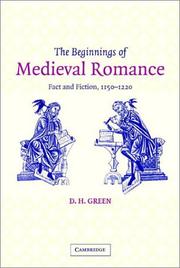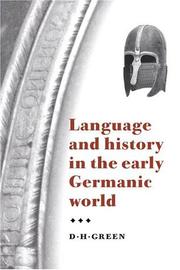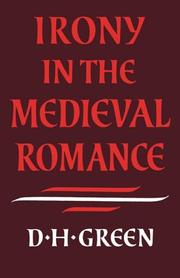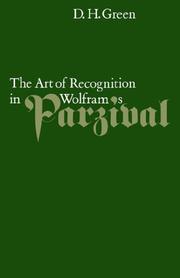| Listing 1 - 10 of 17 | << page >> |
Sort by
|

ISBN: 0521813999 0511020570 9780511020575 9780521813990 0511045581 9780511045585 0511120532 9780511120534 9780511485787 0511485786 1280159677 9781280159671 9786610159673 661015967X 1107125839 9781107125834 0521049563 9780521049566 0511325622 9780511325625 0511157770 9780511157776 Year: 2002 Volume: 47 Publisher: Cambridge, UK New York Cambridge University Press
Abstract | Keywords | Export | Availability | Bookmark
 Loading...
Loading...Choose an application
- Reference Manager
- EndNote
- RefWorks (Direct export to RefWorks)
Up to the twelfth century writing in the western vernaculars dealt almost exclusively with religious, historical and factual themes, all of which were held to convey the truth. The second half of the twelfth century saw the emergence of a new genre, the romance, which was consciously conceived as fictional and therefore allowed largely to break free from traditional presuppositions. Dennis Green explores how and why this happened, and examines this period of crucial importance for the birth of the romance and the genesis of medieval fiction in the vernacular. Although the crucial innovative role of writers in Germany is Green's main concern, he also takes literature in Latin, French and Anglo-Norman into account. This study offers a definition of medieval fictionality in its first formative period in the twelfth century, and underlines the difficulties encountered in finding a place for the fictional romance within earlier literary traditions.
Literature, Medieval --- Romances --- History and criticism. --- -Romances --- -European literature --- Medieval literature --- Chivalric romances --- Chivalry --- Courtly romances --- French romances --- Medieval romances --- Romances, French --- Romans courtois --- French literature --- History and criticism --- Literature [Medieval ] --- Arts and Humanities --- Literature

ISBN: 0511007760 9780511007767 0521471346 9780521471343 Year: 1998 Publisher: Cambridge, U.K New York Cambridge University Press
Abstract | Keywords | Export | Availability | Bookmark
 Loading...
Loading...Choose an application
- Reference Manager
- EndNote
- RefWorks (Direct export to RefWorks)
Book
ISBN: 9780511576607 9780521513357 9781107646292 9780511517983 051151798X 9780511517495 0511517491 0521513359 1107189888 9786612103933 0511516819 1282103938 0511514441 0511515537 1107646294 0511576609 Year: 2009 Publisher: Cambridge Cambridge University Press
Abstract | Keywords | Export | Availability | Bookmark
 Loading...
Loading...Choose an application
- Reference Manager
- EndNote
- RefWorks (Direct export to RefWorks)
In contrast to the widespread view that the Middle Ages were a static, unchanging period in which attitudes to women were uniformly negative, D. H. Green argues that around 1200 the conventional relationship between men and women was subject to significant challenge through discussions in the vernacular literature of the period. Hitherto scholarly interest in gender relations in such literature has largely focused on French romance or on literature in English from a later period. By turning the focus on the rich material to be garnered from Germany - the romances Erec, Tristan and Parzival - Professor Green shows how some vernacular writers devised methods to debate and challenge the undoubted antifeminism of the day by presenting a Utopian model, supported by a revision of views by the Church, to contrast with contemporary practice.
Arthurian romances --- Marriage in literature --- Romances, German --- Women in literature --- Woman (Christian theology) in literature --- Women in drama --- Women in poetry --- History and criticism --- Women in literature. --- Marriage in literature. --- History and criticism. --- Arts and Humanities --- Literature
Book
Year: 1965 Publisher: Cambridge: Cambridge university press,
Abstract | Keywords | Export | Availability | Bookmark
 Loading...
Loading...Choose an application
- Reference Manager
- EndNote
- RefWorks (Direct export to RefWorks)
Book
Year: 1966 Publisher: Cambridge Cambridge University Press
Abstract | Keywords | Export | Availability | Bookmark
 Loading...
Loading...Choose an application
- Reference Manager
- EndNote
- RefWorks (Direct export to RefWorks)
Article
Abstract | Keywords | Export | Availability | Bookmark
 Loading...
Loading...Choose an application
- Reference Manager
- EndNote
- RefWorks (Direct export to RefWorks)

ISBN: 9780511519512 9780521224581 9780521022163 Year: 1979 Publisher: Cambridge Cambridge University Press
Abstract | Keywords | Export | Availability | Bookmark
 Loading...
Loading...Choose an application
- Reference Manager
- EndNote
- RefWorks (Direct export to RefWorks)

ISBN: 9780511519529 9780521245005 9780521020749 Year: 1982 Publisher: Cambridge Cambridge University Press
Abstract | Keywords | Export | Availability | Bookmark
 Loading...
Loading...Choose an application
- Reference Manager
- EndNote
- RefWorks (Direct export to RefWorks)
Article
Abstract | Keywords | Export | Availability | Bookmark
 Loading...
Loading...Choose an application
- Reference Manager
- EndNote
- RefWorks (Direct export to RefWorks)
Book
Year: 1961 Publisher: Canberra Bureau of Mineral Resources, Geology and Geophysics
Abstract | Keywords | Export | Availability | Bookmark
 Loading...
Loading...Choose an application
- Reference Manager
- EndNote
- RefWorks (Direct export to RefWorks)
| Listing 1 - 10 of 17 | << page >> |
Sort by
|

 Search
Search Feedback
Feedback About UniCat
About UniCat  Help
Help News
News